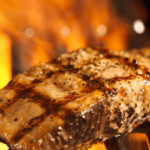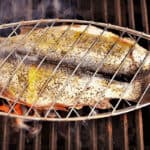Are you wondering if you can cook frozen salmon on the grill? The answer is yes! With a few tips, you can turn frozen salmon into a perfectly charred, delicate piece of fish on the grill without needing to thaw it first.
If you’re in a rush or forgot to defrost something the night before, we’ll show you how to grill frozen salmon straight from the freezer. You’ll learn how to choose the right salmon cut, grill temperature, and cook time, as well as tips for achieving delicious results with this guide. We also have compiled a guide that will help you choose the best fish for grilling.
Can You Cook Salmon from Frozen?
Fish, and salmon in particular, can be cooked straight from the freezer without any ill effects. It is true about most cooking methods except slow cooking, because it can slip into a temperature “danger zone.” This is the range of temperatures between 40°F and 140°F, where bacteria grow rapidly.
Since high-heat cooking methods like grilling exceed these temperature ranges, you’re good to go.
Tips for Grilling Frozen Salmon
For More Even Cooking, Use Smaller Cuts
Now is not the time to pull out a whole side of salmon straight from the freezer. If you want your salmon to be evenly charred and cooked throughout, choose reasonably sized fillets. The fillets should be about 6 ounces each. In this way, you won’t be able to tell that the salmon fillets came straight from the freezer. The full sides of salmon are ideal for proper thawing and an impressive meal.
Keep Salmon from Sticking to the Grill Grates by Using Oil
The worst thing to happen when grilling salmon is for the skin or flesh to stick to the grates, destroying your fillet. Rub your salmon generously with your preferred high-temp cooking fat, such as avocado oil, to prevent this. You can also soak a rag in oil, grab it with tongs, and rub it on your grill grates once they’re hot.
To Add Flavor, Use A Robust Sauce, Well-Seasoned Dry Rub, or Compound Butter
Whether it’s frozen or not, salmon grilled on the grill should be seasoned well. We like to flavor grilled salmon with dry rubs, sauces, glazes, and rich compound butters.
Before grilling (and along with some oil), rub the dry rub into both sides of salmon fillets. Unless you’re working with a sauce or compound butter, save those for later.
Turn Your Grill to 375°F (or Medium-High Heat)
What is the ideal temperature for grilling salmon? If your grill allows you to set the exact temperature, set the temperature to medium-high, or about 375°F. It will be able to char nicely, but remain moist and delicate on the inside.
Spend A Few Extra Minutes Cooking
Any way you cook frozen salmon, you’ll want to add just a few minutes to the cooking time. Since it is frozen, it will take a little longer to cook. For six-ounce fillets, you’ll grill them for about four to five minutes per side. If your fillets are large and thick, gradually increase the cooking time, or decrease the cooking time if they are lighter.
For Extra Flavor, Cook Frozen Salmon in A Foil Packet
Make foil packets on the grill for delicious frozen salmon. Wrap your frozen salmon fillets tightly in foil along with your favorite flavorings, such as butter, herbs, lemon, and spices. Place your foil packet on the grill and cook for 10 to 12 minutes, adjusting the cooking time according to the size of your salmon.
Once you have mastered foil packet salmon, you can add delicious accompaniments like asparagus, baby potatoes, and zucchini. It’s a meal-in-one that’s packed with flavor.
Remove Any Albumin
The downside to cooking salmon straight from the freezer is that it won’t look as pretty in a cookbook. More aggressive cooking results in more visible albumin, a white protein found in all salmon. Grilling salmon straight from the freezer may cause more liquid to ooze out. Scrape it off; it is harmless.
You Should Know When Salmon Is Fully Cooked.
When salmon is cooked perfectly, it shows a few hallmark signs. The flesh should appear opaque and not translucent pink. When pressed with a fork, it should flake easily. You might notice some albumin, as we mentioned.
Salmon should be cooked to 145 degrees Fahrenheit, which will yield a very firm piece of fish.
Was this helpful?
Hi there! I’m a food enthusiast and journalist, and I have a real passion for food that goes beyond the kitchen. I love my dream job and I’m lucky enough to be able to share my knowledge with readers of several large media outlets. My specialty is writing engaging food-related content, and I take pride in being able to connect with my audience. I’m known for my creativity in the kitchen, and I’m confident that I can be the perfect guide for anyone looking to take their culinary journey to the next level.








![Preparing [champ chicken sausage] - raw sausages boiling in a pot and cooking in a pan.](https://milkwoodrestaurant.com/wp-content/uploads/2026/02/image-1-4-150x150.jpg)
